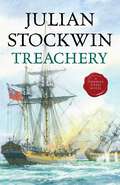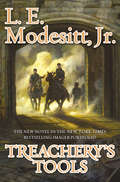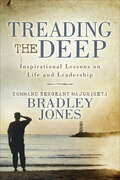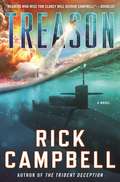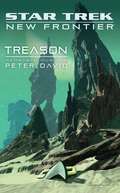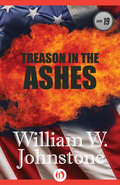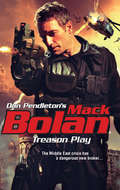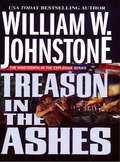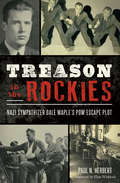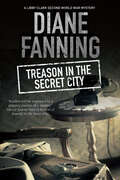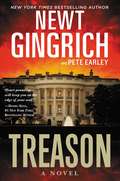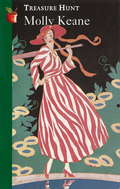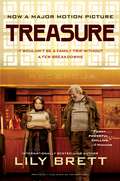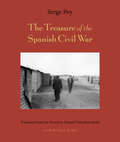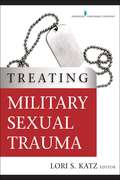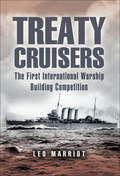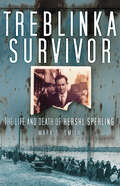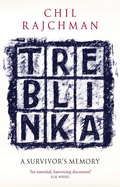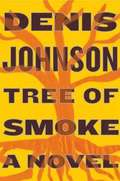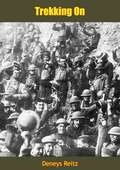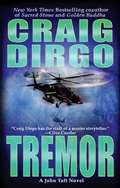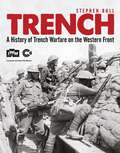- Table View
- List View
Treachery
by Julian StockwinIn this 9th installment of the riveting high-seas nautical adventure series, Lieutenant Thomas Kydd descends into depression following the loss of his fiancée. Rescued from despair by his close friend Renzi, Kydd finds life increasingly difficult when he is framed and dismissed from his ship. The pair eke out a pitiful existence in Guernsey, where, in a moment of desperation, Renzi offers his services to the Prince de Bouillon and becomes embroiled in covert operations. Meanwhile, Kydd accepts the captaincy of a privateer and is soon taking many prizes. Kydd longs to rejoin his rightful place in the navy, however, and when he gets his chance, he risks all for revenge and restoration.
Treachery's Tools (The Imager Portfolio #10)
by L. E. Modesitt Jr.The Imager Porfolio is a bestselling and innovative epic fantasy series from L. E. Modesitt, Jr. that RT Book Reviews says “shines with engrossing characters, terrific plotting, and realistic world-building.” Continue a new story arc with Treachery's Tools.Thirteen years after the events of Madness in Solidar, Alastar has settled into his role as the Maitre of the Collegium and would like nothing better than to focus his efforts on his family.However, bad harvests and worse weather spark acts of violence between the High Holders and the Factors. Once again, Alastar is called upon by the Rex to maintain a careful political balance. Trying to protect his imagers and hold Solidar together for the good of all, Alastar stumbles on to a plot that may lead to insurrection—how many will die before he can stop it?The Imager Portfolio#1 Imager / #2 Imager’s Challenge / #3 Imager’s Intrigue / #4 Scholar / #5 Princeps / #6 Imager’s Battalion / #7 Antiagon Fire / #8 Rex Regis / #9 Madness in Solidar / #10 Treachery’s Tools / #11 Assassin’s Price/ #12 EndgamesOther series by this author:The Saga of RecluceThe Corean ChroniclesThe Spellsong CycleThe Ghost BooksThe Ecolitan MatterAt the Publisher's request, this title is being sold without Digital Rights Management Software (DRM) applied.
Treading the Deep: Inspirational Lessons on Life and Leadership
by Bradley JonesThe gripping real life account of a soldiers service up through the ranks to lead the “Air Pirates” a battalion of combat experienced soldiers, including his own son, demonstrating how inspired leadership mentors and develops subordinates before, during and after serving in combat.
Treason
by Rick CampbellIn Rick Campbell’s newest thriller, a military coup in Russia leads to a swift invasion of former Soviet territories—while the U.S. has been rendered powerless to respond. In Russia, the military is anxious to assert its military strength and regain its role as a superpower. The Russian President refuses to greenlight a bold plan to disable American strategic nuclear capability and retake Ukraine and the Baltic States, fearing the potential consequences of involving nuclear weapons. But the generals won't have it and at the first opportunity, they overthrow the president in a military coup. Then they use a narrow window to initiate their bold plan—the Zolotov option—which will render all of America's B2 bombers and ballistic missiles useless. With the U.S. off the board, they swiftly invade Ukraine with an overwhelming force, an invading Army that even NATO can't hope to resist. Now, it's game on. Without their primary weapons, the U.S. has to find a way to fight back on multiple fronts. If they're to have any chance, they'll have to overcome the malware that has grounded their ballistic missiles and planes, as well as secretly land a SEAL team to help rescue the imprisoned Russian President, and help retake control from the forces that are driving Europe into a continental war. Rick Campbell, one of the finest young military thriller writers, returns with his biggest and boldest novel to date.
Treason (Star Trek)
by Peter DavidIt is a time of political upheaval and uncertainty in the New Thallonian Protectorate. Following the brutal assassination of her husband, Si Cwan, former Starfleet officer-turned-newly-appointed-Prime Minister Robin Lefler must now face the growing danger and intrigue surrounding her newborn son and heir to the noble line of Cwan. Following a harrowing assassination attempt, Robin has no choice but to flee New Thallon with her child...seeking refuge with Captain Mackenzie Calhoun and the crew of the U.S.S. Excalibur and creating a major diplomatic crisis in Sector 221-G. The political fallout between the Federation and the New Thallonian Protectorate pales, however, in comparison to the threat of an enigmatic alien race determined to seize the infant Cwan for its own mysterious purposes. But nothing could possibly prepare Calhoun for the shocking betrayal from within -- an act of treachery to aid and abet this alien race -- forever altering the lives of the Excalibur crew....
Treason In the Ashes (Ashes #19)
by William W. JohnstoneSocial decay buckled America and the Great War brought her to her knees. Out of the ashes, two would-be nation states rise. One is built on values of hard work and justice, under the leadership of the outlaw general, Ben Raines. The other would return all power to the federal government and to the very politicians who plunged the USA into destruction once before... Now, the federals have lined up their forces north of the border for a sweep down into the lower forty-eight. Against three powerful divisions, Raines has thrown up nine battalions of outgunned Rebel fighters. But when the shooting begins, a new battle erupts. This time, Raines faces an enemy from behind his own lines as legions of Rebels sell themselves to the opposition-forcing the Southern States to engage in war.
Treason Play
by Don PendletonThe disappearance of an American journalist in Dubai raises red flags in Washington's covert sectors. The man was a deep cover CIA agent tracking weapons smuggling. When his tortured corpse turns up, Mack Bolan jumps into action, racing to stop the launch of a nuke somewhere in the Middle East. This time, the masterminds aren't the usual suspects. The men behind the conspiracy are Soviet high rollers, rogue players using money, influence and politics to hack off America's long arm in the region and revive Russia's superpower status. Bolan lights fires throughout the region's criminal underbelly, setting his sights on the Pakistani crime lord smuggling the Russian nuke across borders. Leaving a scorched earth calling card for the traitorous British national who brokered the deal, Bolan delivers a death warning to enemies investing in the carnage of innocents: payback is coming in blood.
Treason in the Ashes (Ashes #19)
by William W. JohnstoneA rebel leader faces danger within his ranks during his nation&’s hour of need in this post-apocalyptic thriller from a USA Today–bestselling author. Social decay buckled America and the Great War brought her to her knees. Out of the ashes, two would-be nation states rise. One is built on values of hard work and justice, under the leadership of the outlaw general, Ben Raines. The other would return all power to the federal government and to the very politicians who plunged the USA into destruction once before…. Now, the federals have lined up their forces north of the border for a sweep down into the lower forty-eight. Against three powerful divisions, Raines has thrown up nine battalions of outgunned Rebel fighters. But when the shooting begins, a new battle erupts. This time, Raines faces an enemy from behind his own lines as legions of Rebels. Nineteenth in the long-running series!
Treason in the Rockies: Nazi Sympathizer Dale Maple's POW Escape Plot (Military Ser.)
by Paul N. HerbertA look at one U.S. Army private’s attempt to free Nazi soldiers from a Colorado prisoner of war camp during World War II.Harvard honor alumnus Dale Maple had a promising future, but his obsession with Nazi Germany led to his downfall. Classmates often accused him of pro-Nazi sentiments, and one campus organization even expelled him. After graduation, he enlisted in the U.S. Army, only to be relegated to a unit of soldiers suspected of harboring German sympathies. He helped two German POWs escape imprisonment at Camp Hale and flee to Mexico. The fugitives ran out of gas seventeen miles from the border and managed to cross it on foot, only to be arrested and returned to American authorities. Convicted and sentenced to death for treason, Maple awaited his fate until President Franklin Roosevelt commuted his sentence to life imprisonment. Ultimately, he was released in 1950. Paul N. Herbert narrates the engrossing details of this riveting story.“A well-documented . . . account . . . of Maple’s escapade, set against a background of World War II’s treatment of POWs and German sympathizers.” —The Denver Post
Treason in the Secret City: A World War Two Mystery Set In Tennessee (The Libby Clark Mysteries #2)
by Diane FanningA &“briskly paced and smartly written&” World War II mystery set in Tennessee, featuring research chemist and amateur sleuth Libby Clark (Booklist). May 30, 1944. In the middle of the night, Libby Clark is roused from sleep by a colleague in distress. Marvin&’s cousin Frannie has been charged with treason, and he hopes that Libby, with her clear-headed scientific mind, can help prove her innocence. Libby, a chemist at a secret military facility in Oak Ridge, Tennessee is committed to pursuing the truth wherever it takes her. Libby soon uncovers the immoral Dr. Hansrote, who has tricked Frannie into her treachery. But the evil at Oak Ridge runs deeper. And Libby not only finds herself in conflict with the authorities, but also caught in the crosshairs of a deadly cabal of spies, profiteers, and unscrupulous collaborators. Can Libby survive the confluence of challenges? Or will one of them fashion a trap she cannot escape? Treason in the Secret City is the second book in the Libby Clark Mysteries, which also includes Scandal in the Secret City and Sabotage in the Secret City. &“This sequel to Scandal in the Secret City, which has some basis in fact, is faster-paced than Fanning&’s debut while maintaining the 1940s atmosphere.&” —Booklist
Treason: A Novel (The Major Brooke Grant Series #2)
by Newt Gingrich Pete EarleyLeading politician and bestselling author Newt Gingrich and novelist Pete Earley are back with another gripping international thriller. THE WORLD'S MASTER TERRORIST, known only as the Falcon, has infiltrated Washington's highest corridors of power, threatening the very existence of our democracy in this realistic tale of modern day TREASON. Major Brooke Grant has been waging war against terrorism since her parents were murdered during 9/11, keenly aware that her enemy transcends borders. But a coordinated attack on the president at the funeral of a Washington power broker leads her to a terrifying revelation: the enemy is closer than she'd ever imagined and is hiding in plain sight. The Falcon has gained a weapon no terrorist has ever wielded before: an American-born traitor burrowed inside the U.S. government itself. TREASON is a story of a nation fighting for its life not only against outside threats but also against an internal threat-a fanatical jihadist who uses liberty as a shield while trying to destroy the civilization created in its image. Major Grant's deadly chess match with the Falcon turns personal when he issues a fatwa against her and those she loves. Can she unmask the traitor and stop the Falcon's most skilled assassin sent to kill her before he strikes? Or will she fall victim to betrayal by a false friend in this gripping tale of treachery, courage, and ultimately patriotism where good battles evil? Only Newt Gingrich, who brings decades of experience in national security and politics to bear in his collaboration with journalist Pete Earley, can spin such a vivid mix of reality and fiction, daring readers to guess where the line between the two is crossed.
Treasure Hunt (Virago Modern Classics #230)
by Molly KeaneAngel, formidable hostess, social charmer and mother par excellence, confidently awaits the return of her little boy from the trials of war. She could not anticipate that the teenager who went away will return a grown man - bronzed and world-weary - a sophisticated American widow on his arm. Nor could she anticpate that her irrepressible daughter Slaney will similarly throw herself into romance (without asking her advice) and even her niece Tiddley will show an unexpected determination in getting on with her life. Faced with domestic insurrection on a grand scale, Angel will have to sharpen her wits to maintain her tyranny.
Treasure Hunt (Vmc Ser. #62)
by Molly KeaneAngel, formidable hostess, social charmer and mother par excellence, confidently awaits the return of her little boy from the trials of war. She could not anticipate that the teenager who went away will return a grown man - bronzed and world-weary - a sophisticated American widow on his arm. Nor could she anticpate that her irrepressible daughter Slaney will similarly throw herself into romance (without asking her advice) and even her niece Tiddley will show an unexpected determination in getting on with her life. Faced with domestic insurrection on a grand scale, Angel will have to sharpen her wits to maintain her tyranny.
Treasure [Movie Tie-in]: A Novel
by Lily BrettSOON TO BE A MAJOR MOTION PICTURE STARRING LENA DUNHAM AND STEPHEN FRY.A "haunting, riotously funny, and deeply touching" (Publishers Weekly) novel about a woman and her father's journey to Poland to revisit her family historyRuth Rothwax finds order and meaning in the words she writes for other people, but she can’t find words to understand the loss her family experienced during World War II. She becomes obsessed with the idea of returning to Poland with her father, Edek, making sense of her family’s past, and visiting the places where her beloved parents lived and almost died. But there’s more to this trip than Ruth can plan for. By facing Poland and the past, she might be able to confront her own future.Treasure is the gripping story of a woman’s search for memory and meaning, and the reconciliation of present and past within the complicated fabric of family. Acclaimed bestselling author Lily Brett explores the reverberations of loss through this remarkable and unforgettable journey of the heart."[Brett] has an incredibly ability to explain the Jewish experience, and the human experience." — LENA DUNHAM"[Brett's] such an easy writer to read... beautifully funny, complex, and delightful as well." — STEPHEN FRY
Treasure of the Spanish Civil War
by Serge PeyAn intimate portrait of childhood during Spain's violent fascist regime, rendered in a surreal kaleidoscope of linked stories.Serge Pey's stories are lyrical, vivid vignettes of life during and directly following Spain's violent fascist regime of the thirties and forties. The collection is a defiant ode to the resilience of the human spirit, each story depicting a small act of human resistance: a man plants a fruit tree for each of his assassinated comrades; a professor hides a secret library of banned books in plain sight. Many of the stories are surreal, fable-like impressions from the perspective of children caught in the midst of the political violence. Pey's understated yet unusual prose renders a brutal landscape with childlike wonder. The Treasure of the Spanish Civil War and Other Tales is a strikingly original meditation on courage, survival, and hope in the face of oppression.
Treating Military Sexual Trauma
by Lori S. KatzAn evidence-based text for understanding and treating MST from multiple perspectives The incidence of sexual assault and harassment experienced by members of the U.S. Armed forces has reached epidemic proportions. Its victims often suffer from devastating, life-long consequences to their careers, health, relationships, and psychological wellbeing. This authoritative resource is written for mental health clinicians about understanding and treating military sexual trauma (MST). Based on a solid foundation of research and clinical expertise, it addresses the complex circumstances of victims of sexual abuse in the military and how clinicians can meet the unique challenges of treating these clients. The book describes how MST differs from other forms of military trauma such as combat and discusses its prevalence, neurobiology, and social contexts as well as unique stressors of betrayal, injustice, struggles with issues of reporting and disclosure, and impact on relationships and sexuality. It reviews current evidence-based interventions and offers insights on treating specific symptoms within MST, such as PTSD, anxiety, substance abuse, sleep disorders, and sexual dysfunction. Chapters discuss how a variety of psychotherapies can be used to treat MST, including Prolonged Exposure, Cognitive Processing, EMDR, Seeking Safety, ACT, and Somatic Experiencing, as well as the Warrior Renew MST group therapy program. Clinicians, who work with veterans and active duty personnel, will find this book an essential guide to working with MST survivors.
Treatment for Posttraumatic Stress Disorder in Military and Veteran Populations
by Committee on the Assessment of Ongoing Effects in the Treatment of Posttraumatic Stress DisorderPrior to the military conflicts in Iraq and Afghanistan, wars and conflicts have been characterized by such injuries as infectious diseases and catastrophic gunshot wounds. However, the signature injuries sustained by United States military personnel in these most recent conflicts are blast wounds and the psychiatric consequences to combat, particularly posttraumatic stress disorder (PTSD), which affects an estimated 13 to 20 percent of U. S. service members who have fought in Iraq or Afghanistan since 2001. PTSD is triggered by a specific traumatic event - including combat - which leads to symptoms such as persistent re-experiencing of the event; emotional numbing or avoidance of thoughts, feelings, conversations, or places associated with the trauma; and hyperarousal, such as exaggerated startle responses or difficulty concentrating. As the U. S. reduces its military involvement in the Middle East, the Departments of Defense (DoD) and Veterans Affairs (VA) anticipate that increasing numbers of returning veterans will need PTSD services. As a result, Congress asked the DoD, in consultation with the VA, to sponsor an IOM study to assess both departments' PTSD treatment programs and services. Treatment for Posttraumatic Stress Disorder in Military and Veteran Populations: Initial Assessment is the first of two mandated reports examines some of the available programs to prevent, diagnose, treat, and rehabilitate those who have PTSD and encourages further research that can help to improve PTSD care.
Treaty Cruisers: The First International Warship Building Competition
by Leo Marriott&“A quite enlightening book that discusses the most important group of heavy cruisers serving during WW2 and how the type evolved.&” —Malcolm Wright, author of British and Commonwealth Warship Camouflage of WWII The Washington Naval Treaty of 1921 and subsequent treaties in the 1930s effectively established the size and composition of the various navies in World War II. In particular, they laid down design parameters and tonnage limitations for each class of warship, including battleships, aircraft carriers, cruisers, and destroyers. With one or two exceptions, battleship construction was deferred until the mid 1930s, but virtually all navies embraced the concept of the eight-inch gun-armed, 10,000-ton heavy cruisers and constructed new vessels almost immediately. This book will trace the political processes which led to the treaties, describe the heavy cruisers designed and built to the same rules by each nation, and then consider how the various classes fared in World War II and attempt to assess which was the most successful. Ships from the navies of Britain, France, Italy, Germany, the United States, and Japan are included. Appendices cover construction tables, the history of each ship, technical specifications, armament, and aircraft carried. &“The author has crafted a book that is both a technical read and popular history. The book provides an excellent overview of the reasoning each country employed in building its interwar cruiser force and how they committed these ships to battle. If development of and employment of weapon systems is of interest to you, this is a must-read book.&” —Naval Historical Foundation
Treblinka Survivor: The Life and Death of Hershl Sperling
by Mark S SmithMore than 800,000 people entered Treblinka, and fewer than seventy came out. Hershl Sperling was one of them. He escaped. Why then, fifty years later, did he jump to his death from a bridge in Scotland? The answer lies in a long-forgotten, published account of the Treblinka death camp, written by Hershl Sperling himself in the months after liberation and discovered in his briefcase after his suicide. It is reproduced here for the first time. In Treblinka Survivor, Mark S. Smith traces the life of a man who survived five concentration camps, and what he had to do to achieve this. Hershl's story, which takes the reader through his childhood in a small Polish town to the bridge in faraway Scotland, is testament to the lasting torment of those very few who survived the Nazis' most efficient and gruesome death factory. The author personally follows in his subject's footsteps from Klobuck, to Treblinka, to Glasgow.
Treblinka: A Survivor's Memory
by Chil RajchmanChil Rajchman, a Polish Jew, was arrested with his younger sister in 1942 and sent to Treblinka, a death camp where more than 750,000 were murdered before it was abandoned by German soldiers. His sister was sent to the gas chambers, but Rajchman escaped execution, working for ten months under incessant threats and beatings as a barber, a clothes-sorter, a corpse-carrier, a puller of teeth from those same bodies. In August 1943, there was an uprising at the camp, and Rajchman was among the handful of men who managed to escape. In 1945, he set down this account, a plain, unembellished and exact record of the raw horror he endured every day. This unique testimony, which has remained in the sole possession of his family ever since, has never before been published in English. For its description of unspeakably cruelty, Treblinka is a memoir that will not be superseded. In addition to Rajchman's account, this volume includes the complete text of Vasily Grossman's 'The Hell of Treblinka', one of the first descriptions of a Nazi extermination camp; a powerful and harrowing piece of journalism written only weeks after the camp was dissolved. Introduction by Samuel Moyn, Professor of History at Columbia University and author of A Holocaust Controversy: The Treblinka Affair in Postwar France.
Treblinka: A Survivor's Memory
by Chil RajchmanChil Rajchman, a Polish Jew, was arrested with his younger sister in 1942 and sent to Treblinka, a death camp where more than 750,000 were murdered before it was abandoned by German soldiers. His sister was sent to the gas chambers, but Rajchman escaped execution, working for ten months under incessant threats and beatings as a barber, a clothes-sorter, a corpse-carrier, a puller of teeth from those same bodies. In August 1943, there was an uprising at the camp, and Rajchman was among the handful of men who managed to escape. In 1945, he set down this account, a plain, unembellished and exact record of the raw horror he endured every day. This unique testimony, which has remained in the sole possession of his family ever since, has never before been published in English. For its description of unspeakably cruelty, Treblinka is a memoir that will not be superseded. In addition to Rajchman's account, this volume includes the complete text of Vasily Grossman's 'The Hell of Treblinka', one of the first descriptions of a Nazi extermination camp; a powerful and harrowing piece of journalism written only weeks after the camp was dissolved. Introduction by Samuel Moyn, Professor of History at Columbia University and author of A Holocaust Controversy: The Treblinka Affair in Postwar France.
Tree of Smoke
by Denis JohnsonThe story of William 'Skip' Sands, CIA, engaged in Psychological Operations against the Viet Cong, and the disasters that befall him. Also the story of the Houston brothers, Bill and James, young men who drift out of the Arizona desert and into a war where the line between disinformation and delusion has blurred away. In its vision of human folly, this is a story like nothing in our literature.<P><P> Winner of the National Book Award
Trekking On: In The Company Of Brave Men
by Deneys Reitz F.-M. J. C. SmutsA narrative of the author’s life in exile following the Boer War, his work upon his return to South Africa, and his part in the European war, first in South Africa and later in Europe.“Breathlessly exciting”—The Times Literary Supplement
Tremor
by Craig DirgoOver a hundred years ago, Nikola Tesla created a device for transferring electricity without wires. It was supposed to be his greatest triumph. Instead, his invention spawned a nightmare so terrifying that it was hidden from the world...until now. Unusual surges of electricity are being tracked emanating from the former Yugoslavia. Special Agent John Taft of the National Intelligence Agency is dispatched to investigate the phenomenon, and uncovers a conspiracy of terror, led by a fanatical Serbian nationalist and powered by a machine capable of targeting any location on the globe-and causing apocalyptic earthquakes to strike on command. Now, as the terrorists fell cities at will with their earth-shattering weapon, Taft must fight a battle on dangerous ground, against an unstable foe whose greatest desire is to control the world--or destroy it.
Trench
by Stephen Bull'Going up Beek trench on a dark night was no picnic. You started along a long narrow alley winding uphill, your hands feeling the slimy sandbag walls, your feet wary for broken duck boards; now and again a hot, stuff smell, a void space in the wall, and the swish of pumped up water under foot proclaimed the entrance to a mine. ... round corners you dived under narrow tunnels two or three feet high, finally emerging into the comparative open of the front line trench.' Soldier, 1/4th Battalion, Loyal North Lancashire Regiment, 1916In this new book, First World War trench expert Stephen Bull provides a complete picture of trench warfare on the Western Front, from the construction of the trenches and their different types, to the new weaponry and tactics employed in defense and attack. In addition, the book describes the experience of life in the trenches, from length of service, dealing with death and disease, to uniforms and discharge. Alongside his compelling narrative of the campaigns fought in the trenches from 1914 to 1918, annotated trench maps highlight particular features of the trenches, while photographs, documents, and first-hand accounts combine to give a full and richly detailed account of war in the trenches.
